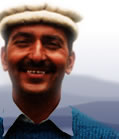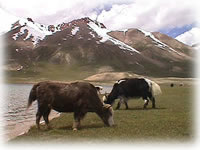 |
 |
||
 |
|||
|
RELATED THEMES development employment and income family life migration tourism OTHER LOCAL THEMES BACKGROUND |
economics
Prior to the construction of the Karakoram Highway (KKH) Shimshal was considered relatively wealthy in Hunza and Gojal, in terms of its plentiful land and livestock. Landlessness is not an issue in Shimshal. There is sufficient agricultural land for all villagers to feed themselves, and when any barren land is developed for cultivation, it is distributed equally amongst all households. The KKH changed perceptions of wealth and also brought new economic opportunities for the villages alongside this highway. These villages prospered whilst Shimshal did not. However, in the last decade or so more and more Shimshalis are earning a cash income through either portering or mountaineering, or waged employment within or outside the village. In fact portering has become one of the main sources of the community's income. As one woman explains, "My husband does portering for the tourists… If there were no tourists visiting the village then people would sell their cows, livestock and yaks to meet these expenses" (Pakistan 26). Many narrators do refer to increased standards of living today and people predict that this will continue with completion of the road to Shimshal. One of the comparisons made between city and village life is the dependence on cash in the city. A woman who has spent some time in Karachi explains, "…city life is a game of money. You have to pay for everything like water, and fuel wood etc… We are grateful to God for giving us this land… People who live in cities are paying for everything... People who are having low monthly income and a rented house always remain worried in the city that I have to pay the rent of my house, I have to fulfil other expenses of my home… So we are grateful to God that we…are working with our own hands, we have our own lands, homes, free drinking water…" (Pakistan 21). A number of narrators talk about poverty in the past and there is a general feeling that although times are still hard there is more prosperity today. One narrator talks about the increase in resources eliminating the difference between rich and poor: "Today there is no difference between poor and rich. In olden times the poor would beg from the rich fellow, they would beg for wool and cloths. They would also borrow foodstuff from one another. But God has eliminated the difference between the poor and the rich and everything is available to everyone today" (Pakistan 9). Education and marriage are two areas of significant expenditure for households. Although education is almost universal, it can still be difficult for some households to afford the fees and uniform. And despite the commitment to education some people are forced to withdraw their children from school (usually secondary) because they need them to contribute to the household's income. Expenditure on marriages and funerals has gone down in recent years due to a farman (instruction/guidance) from the Aga Khan who suggested that people should spend their money on their children's education instead of lavish celebrations. Whilst some narrators talk of Shimshalis' lack of business sense, and the limited involvement in the cash economy, Shimshalis, and particularly women, certainly have experience of managing their household resources throughout the year in terms of storage and rationing. The credit and savings schemes initiated by Aga Khan Rural Support Programme (AKRSP) probably benefit from this long tradition of good management of household resources throughout the year. quotes about economics"As I told you [yaks] have so many advantages…we can sell them and the income can be saved in a bank for the education of our children. [But]…the production should be continued according to our limitations, like the grass in our pastures. The birth rate per year is 200 yaks. So we should sell at least 100 yaks per year to get the benefit, otherwise this productivity will be useless for all of us." "Tourism is the major source of income in Shimshal. Our people trek with tourists and earn money and they save the money in the bank and then spend it on their children's education and also meet their household expenses. Tourism is not the sole source of income in Shimshal. People also go to Pamir with their yaks. They make livestock products and earn money and meet their needs. They also sell their yaks…" "…in modern societies, wealth is defined as personal belongings such as cash, property, material… but in our traditional society we have a different definition of wealth. One definition…is the same as in modern society - possession of more resources; but the second and more important definition…is that a strong and healthy person is potentially wealth for the society, the family possessing more members with diverse skills and expertise are also potential wealth for the community, because they contribute their skills and physical strength for the community's benefit." "In those days there was no source of income - very few opportunities were available; the expenditure and cost of living were also nominal. People were satisfied with the situation and not that busy. They had a lot of time for leisure, entertainment and other activities. But today, with the increase in population, people are working very hard, everybody has to work… the number of livestock has increased and the inflow of money has also increased. It is a symbol of development. People have got jobs and they are earning more. People like me who have no jobs and no source of income have to depend on agriculture." "…after the road there would definitely be a big change… we have a lot of our local products which have no value now, for example, palos (local woven carpet made of yak or goat hair) [but] after the road we would be able to make our own factory in Shimshal. Now we waste most of the goat hair, but in future we will collect these hairs together and instead of wasting that we would properly make use of that and sell these sorts of products to generate income." When AKRSP came to the village it organised the people in the form of social organisations. People got united, pooled their resources and started saving money… It was the general perception of the people that savings could only be possible with thousands or hundreds of thousands of rupees, but AKRSP taught the people that savings can be made even with a single rupee. They advised us that if a certain amount is saved weekly it would be a considerable amount after some years, and this amount could be utilised for the education of children or in any emergency situation. People then started saving money…" It (mountaineering) is a game that brings heavy financial support to the country from international countries. And if a country gets one million rupees for a mountain as a royalty from the international community, then many many people get the opportunity to earn their living from it; it includes hotels, transportation, portering. Due to this profession Pakistan is getting funds and many people are getting employment opportunities. |
|
 Shimshal's economy used to be based on agriculture, livestock and hunting. Today it is based on agriculture, livestock, tourism and some off-farm employment. In the past, livestock was the key measure of a household's wealth. One man explains,
Shimshal's economy used to be based on agriculture, livestock and hunting. Today it is based on agriculture, livestock, tourism and some off-farm employment. In the past, livestock was the key measure of a household's wealth. One man explains,